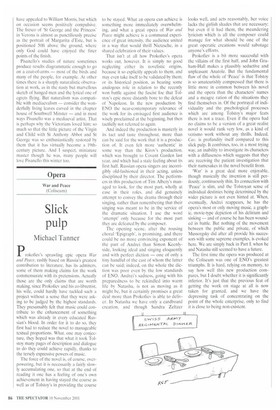War and Peace (Coliseum)
Slick pulp
Michael Tanner
Prokofiev's sprawling epic opera War and Peace, rashly based on Russia's greatest contribution to literature, has its admirers, some of them making claims for the work commensurate with its pretensions. Actually those are the only claims that are worth making, since Prokofiev and his co-librettist. his wife, could hardly have tackled such a project without a sense that they were asking to be judged by the highest standards. They presumably felt that music could contribute to the enhancement of something which was already in every educated Russian's blood. In order for it to do so, they first had to reduce the novel to manageable textual proportions. What, one may conjecture, they hoped was that what it took Tolstoy many pages of description and dialogue to do they could achieve rapidly, thanks to the tersely expressive powers of music.
The force of the novel is, of course, overpowering, but it is necessarily a fairly slowly accumulating one, so that at the end of reading it one has a feeling of one's own achievement in having stayed the course as well as of Tolstoy's in providing the course
to be stayed. What an opera can achieve is something more immediately overwhelming, and what a great opera of War and Peace might achieve is a communal experience of great intensity, the audience united in a way that would thrill Nietzsche, in a shared celebration of their values.
That isn't at all how Prokofiev's opera works out, however. It is simply no good neglecting either its novelistic origins, because it so explicitly appeals to them, and may even take itself to be validated by them; or its historical position, as bearing some analogous role in relation to the recently won battle against the fascist foe that Tolstoy's epic more distantly bore to the defeat of Napoleon. In the new production by ENO the near-contemporary relevance of the work for its envisaged first audience is wisely proclaimed at the beginning, but then tactfully not referred to again.
And indeed the production is masterly in its tact and taste throughout, more than can be said for the work that it is a production of. It even felt more 'authentic' in some way than the Kirov's production, which was brought to Covent Garden last year, and which had a stale feeling about its first half. Russian opera singers are incorrigibly old-fashioned in their acting, unless disciplined by their director. The performers in this production of Tim Albery's managed to look, for the most part, wholly at ease in their roles, and did genuinely attempt to convey the drama through their singing, rather than remembering that their singing was meant to be in the service of the dramatic situation. I use the word 'attempt' only because for the most part they are defeated by the composer.
The opening scene, after the rousing choral 'Epigraph', is promising, and there could be no more convincing exponent of the part of Andrei than Simon Keenlyside, looking ideal and singing eloquently and with perfect diction — one of only a tiny handful of the cast of whom the latter can be said; indeed, on the whole the diction was poor even by the low standards of ENO. Andrei's sadness, going with his preparedness to be rekindled into warm life by Natasha, is not as moving as it might be, but it certainly promises a great deal more than Prokofiev is able to deliver. In Natasha we have only a cardboard creation, and though Sandra Zeltzer looks well, and acts reasonably, her voice lacks the girlish shades that are necessary; but even if it had them, the meandering lyricism which is all the composer could manage for what should be one of the great operatic creations would sabotage anyone's efforts.
Prokofiev is a bit more successful with the villains of the first half, and John Graham-Hall makes a plausibly seductive and unpleasant Anatole. But the fundamental flaw of the whole of 'Peace' is that Tolstoy is so amateurishly compressed that there is little more in common between his novel and the opera than the characters' names and a meagre ration of the situations they find themselves in. Of the portrayal of individuality and the psychological processes which are among Tolstoy's major feats there is not a trace. Even if the opera had no claims to be a version of a great realist novel it would rank very low, as a kind of verismo work without any thrills. Indeed, Cal, is profundity itself compared to this slick pulp. It combines, too, in a most trying way, an inability to investigate its characters with a diffuseness which suggests that they are receiving the patient investigation that their namesakes in the novel benefit from.
'War' is a great deal more enjoyable, though musically the invention is still perilously, continuously thin. Its connection with 'Peace' is slim, and the Tolstoyan sense of individual destinies being determined by the wider picture is not even hinted at. When, eventually, Andrei reappears, he has the opera's most or only moving music, a graphic, movie-type depiction of his delirium and sinking — and of course he has been wounded in battle. But nothing of the movement between the public and private, of which Mussorgsky did after all provide his successors with some supreme examples, is evoked here. We are simply back in Part I, when he and Natasha still seemed to have a future.
The first time the opera was produced at the Coliseum was one of ENO's greatest triumphs. It is hard, relying on memory, to say how well this new production compares, but I doubt whether it is significantly inferior. It's just that the previous feat of getting the work on stage at all is now taken for granted, and we have the depressing task of concentrating on the point of the whole enterprise, only to find it is close to being non-existent.














































































































 Previous page
Previous page